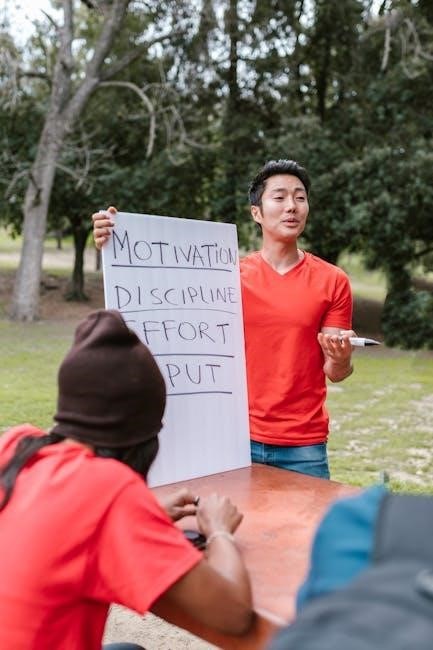Instructional Coach Day is a celebration of educators who empower teachers through targeted support and innovative strategies. It honors their dedication to fostering professional growth and enhancing educational experiences. Recognizing their impact, this day highlights the crucial role instructional coaches play in shaping teaching excellence and student success.

1.1 Understanding the Role of an Instructional Coach
An instructional coach is an educator who works collaboratively with teachers to enhance teaching practices and improve student learning outcomes. Their primary role involves providing personalized support, sharing best practices, and helping teachers implement effective instructional strategies. Coaches often use data and observations to identify areas for growth and tailor their support accordingly. They act as mentors, facilitating professional development and fostering a culture of continuous improvement. Instructional coaches do not replace teachers but empower them by offering resources, feedback, and guidance. Their work is rooted in building teacher capacity, which ultimately benefits students. By focusing on teacher development, instructional coaches play a pivotal role in advancing educational excellence and ensuring that classrooms are dynamic, engaging, and effective learning environments.
1.2 The Importance of Celebrating Instructional Coaches
Celebrating instructional coaches is essential to recognize their vital contributions to education. These professionals dedicate their expertise to empowering teachers, enhancing instructional practices, and fostering student success. By acknowledging their efforts, we highlight the significant impact they have on educational communities. Celebrating instructional coaches boosts morale, reinforces their commitment, and inspires continued excellence in their work. It also underscores the value of collaboration and professional growth in schools. Recognizing their role encourages a culture of appreciation and teamwork, which benefits both educators and students. Instructional coaches often work behind the scenes, so celebrating them brings their important work to the forefront. This recognition not only honors their dedication but also motivates others to strive for excellence in education. Ultimately, celebrating instructional coaches strengthens the foundation of our educational system and ensures a brighter future for teaching and learning.

Defining Instructional Coaching
Instructional coaching is a collaborative process where educators work together to enhance teaching practices. It focuses on personalized growth, improving instructional strategies, and fostering a supportive environment for both teachers and students.
2.1 What is Instructional Coaching?
Instructional coaching is a professional development process where coaches work one-on-one or in small groups with teachers to improve instructional strategies and student outcomes. It involves collaborative goal-setting, observation, feedback, and reflection. Coaches provide personalized support, helping educators enhance their teaching methods and address specific challenges. This approach focuses on sustainable growth, encouraging teachers to take ownership of their development. Instructional coaching is not about evaluating performance but about fostering a culture of continuous improvement and innovation in education. By sharing best practices and resources, coaches empower teachers to create engaging and effective learning environments. This collaborative effort ultimately benefits both educators and students, leading to improved academic achievements and a more dynamic classroom experience.
2.2 Key Characteristics of Effective Instructional Coaching
Effective instructional coaching is built on collaboration, trust, and a focus on teacher growth. Coaches work closely with educators to identify strengths, challenges, and goals, providing tailored support. They use observation, feedback, and reflection to foster improvement. A key characteristic is the ability to build strong relationships, ensuring teachers feel supported rather than evaluated. Coaches are also skilled communicators, able to articulate strategies clearly and listen actively. They stay updated on best practices and adapt their approaches to meet diverse needs. Flexibility and patience are essential, as coaching is a gradual process. Ultimately, successful instructional coaching empowers teachers to take ownership of their development, leading to enhanced teaching practices and improved student outcomes. These characteristics create a foundation for meaningful professional growth and sustained educational success.
The Role of an Instructional Coach
Instructional coaches empower teachers by providing targeted support, resources, and strategies to enhance teaching practices. They collaborate to set goals, observe classrooms, and offer constructive feedback, fostering professional growth and student success.

3.1 Responsibilities of an Instructional Coach
An instructional coach collaborates with teachers to enhance teaching practices, fostering a supportive environment for professional growth. Key responsibilities include setting instructional goals, developing resources, and conducting classroom observations. They provide constructive feedback, facilitate professional development, and analyze data to inform teaching strategies. Coaches also assist in implementing new educational technologies and methodologies, ensuring alignment with curriculum standards. By offering personalized support, they help educators refine their skills, ultimately improving student outcomes and school-wide performance.
3.2 The Impact of Instructional Coaches on Teacher Development
Instructional coaches play a pivotal role in fostering teacher development by providing tailored support and resources. They help educators refine their teaching strategies, adapt to new methodologies, and enhance classroom effectiveness. Through collaborative goal-setting and constructive feedback, coaches empower teachers to reflect on their practices and implement improvements. This leads to increased confidence, improved instructional skills, and a greater ability to meet student needs. Additionally, instructional coaches facilitate professional growth opportunities, such as workshops and peer-to-peer learning, which strengthen teacher morale and retention. Their impact extends beyond individual teachers, contributing to a culture of continuous improvement within schools. By bridging the gap between theory and practice, instructional coaches directly influence the quality of education, ensuring that teachers are well-equipped to inspire and nurture their students effectively.
3.3 Skills and Qualities of a Successful Instructional Coach
A successful instructional coach possesses a unique blend of skills and qualities that enable them to effectively support teachers and enhance educational outcomes. Strong communication and interpersonal skills are essential, as they foster collaboration and trust between coaches and educators. Empathy and a deep understanding of teacher challenges allow coaches to provide tailored, meaningful support. Leadership abilities are also critical, as coaches often guide professional development initiatives and facilitate school-wide improvements. Additionally, instructional coaches must be adaptable, able to navigate diverse teaching styles and school cultures. Their expertise in curriculum design, instructional strategies, and assessment methods ensures they can offer evidence-based guidance. Coaches who are reflective practitioners, committed to their own continuous learning, inspire teachers to embrace growth mindsets. Ultimately, a successful instructional coach is a catalyst for teacher development, driving instructional excellence and student achievement through their dedication and expertise.

Celebrating Instructional Coaches
Celebrating instructional coaches involves recognizing their vital role in enhancing teacher effectiveness and student outcomes. Through creative events, personalized gestures, and heartfelt acknowledgments, we honor their dedication to fostering educational growth and excellence.
4.1 Ideas for Celebrating Instructional Coaches Day
Celebrating Instructional Coaches Day can be done through thoughtful and creative activities that highlight their contributions. One idea is to create a “Wall of Fame” in a common area, showcasing appreciation messages from teachers and students. Personalized gifts, such as customized mugs or plaques, can also be meaningful gestures. Hosting a virtual or in-person celebration with a showcase of best practices is another way to honor their work. Additionally, organizing cross-grade collaboration days or student feedback sessions can demonstrate the impact of instructional coaches. Simple acts, like writing heartfelt thank-you notes or providing a small token of appreciation, can also make a significant difference. These ideas not only recognize their dedication but also strengthen the sense of community and gratitude within the school.
4.2 Recognizing the Contributions of Instructional Coaches
Recognizing the contributions of instructional coaches is essential to acknowledging their pivotal role in education. These professionals work tirelessly to support teachers, helping them refine their skills and implement effective teaching strategies. By providing personalized guidance, instructional coaches empower educators to enhance student learning outcomes. Their contributions extend beyond individual teacher development, as they often lead school-wide initiatives, such as professional development workshops and collaborative activities. Instructional coaches also play a key role in fostering a culture of continuous improvement, encouraging teachers to reflect on their practices and set meaningful goals. Their ability to connect with educators at all levels of experience makes them invaluable to school communities. Celebrating their efforts not only boosts morale but also underscores the importance of their work in shaping the future of education. Acknowledging their dedication ensures that instructional coaches feel valued and motivated to continue their impactful work.
4.3 Case Studies of Successful Instructional Coach Celebrations
Several schools have successfully celebrated Instructional Coaches Day through creative and meaningful activities. One case study highlights a school that created a “Wall of Fame” in a common area, showcasing appreciation for their instructional coaches with personalized notes and photos. Another example involved hosting a professional development workshop led by the coaches themselves, followed by a recognition ceremony. Some schools have also incorporated student involvement, such as having students create handmade cards or videos thanking the coaches for their support. These celebrations not only boosted morale but also strengthened the sense of community within the school. By sharing these success stories, other institutions can draw inspiration to honor their instructional coaches effectively. Such events demonstrate the positive impact of recognizing the hard work and dedication of these educators. They serve as a testament to the value instructional coaches bring to the educational landscape.
Professional Development for Instructional Coaches
Professional development for instructional coaches involves continuous learning, reflective practices, and collaborative activities. These opportunities enhance their skills, ensuring they stay updated on effective strategies to support teacher growth and student success.
5.1 Continuous Learning Opportunities for Instructional Coaches
Continuous learning is essential for instructional coaches to stay effective in their roles. Workshops, webinars, and conferences provide platforms for coaches to gain new strategies and insights. These opportunities allow them to explore innovative teaching methods, educational technologies, and leadership techniques. Collaborative learning experiences, such as peer coaching and study groups, further enhance their professional development. Reflective practices, like journaling and feedback sessions, help coaches refine their approaches. Additionally, engaging with educational literature and research keeps them informed about best practices. Schools often support these efforts by allocating time and resources for ongoing education. By prioritizing continuous learning, instructional coaches ensure they remain equipped to support teachers and students effectively, fostering a culture of growth and excellence in education.

5.2 Reflective Practices for Instructional Coaches
Reflective practices are vital for instructional coaches to evaluate their effectiveness and grow professionally. Journaling, feedback sessions, and self-assessment are common methods used to reflect on coaching experiences. These practices help coaches identify strengths, areas for improvement, and the impact of their strategies on teacher development. Reflective practices also encourage coaches to align their work with school goals and educational standards. By analyzing their interactions and outcomes, coaches can refine their approaches and adapt to changing educational needs. Additionally, reflective practices foster a mindset of continuous improvement, enabling coaches to stay responsive to the evolving demands of teaching and learning. Regular reflection ensures that instructional coaches remain effective in supporting educators and contributing to a positive educational environment. This process not only enhances their professional skills but also strengthens their ability to empower teachers and students alike.

5.3 Collaborative Activities for Instructional Coaches
Collaborative activities are essential for instructional coaches to foster teamwork and shared learning. Cross-grade level collaborations, where coaches work with teachers from different grades, promote consistency and alignment in teaching strategies. Virtual showcases of best practices allow coaches to share successful methods and learn from one another. Peer coaching and professional learning communities also provide platforms for collaborative growth. These activities encourage coaches to reflect on their practices, gain new insights, and adapt innovative approaches. Collaborative feedback sessions with teachers help coaches refine their support strategies, ensuring they meet the specific needs of educators. By engaging in these activities, instructional coaches build stronger relationships with teachers and contribute to a culture of continuous improvement. Such collaborations not only enhance coaching effectiveness but also create a supportive environment that benefits both teachers and students. These shared efforts are key to sustaining professional growth and educational excellence. Collaborative activities are vital for the success of instructional coaching programs.

The Future of Instructional Coaching
The future of instructional coaching lies in innovation, technology integration, and personalized learning strategies. Coaches will adapt to emerging trends, leveraging digital tools to enhance teacher development and student outcomes effectively.
6.1 Emerging Trends in Instructional Coaching
Emerging trends in instructional coaching emphasize technology integration, personalized learning, and collaborative teacher-coach relationships. Coaches are increasingly using AI-driven tools for data analysis to tailor support strategies. Virtual and augmented reality are being explored to create immersive learning environments. There is also a growing focus on equity and inclusivity, ensuring all teachers and students benefit equally. Coaches are adopting trauma-informed practices to address educators’ well-being. Professional learning communities and micro-credentials are gaining popularity for continuous development. The role of coaches is expanding to include leadership mentoring and curriculum design. These trends reflect a shift toward more dynamic, adaptive, and teacher-centered approaches, aiming to enhance both instructional quality and educator satisfaction. By embracing innovation, instructional coaching continues to evolve as a vital component of modern education systems.
6.2 The Evolving Role of Instructional Coaches in Education
The role of instructional coaches is expanding beyond traditional boundaries, adapting to modern educational needs. Coaches are now integral to school-wide initiatives, often taking on leadership roles and contributing to curriculum design. They are increasingly involved in mentoring programs, supporting teacher well-being, and fostering collaborative learning environments. Technology integration has become a key focus, with coaches helping educators implement digital tools effectively. Additionally, there is a growing emphasis on equity and inclusivity, ensuring all students and teachers benefit from coaching support. Coaches are also being called upon to address systemic challenges, such as teacher retention and student engagement. This evolution reflects the recognition of instructional coaches as vital partners in improving educational outcomes. Their role continues to shift from solely supporting individual teachers to driving broader organizational change and innovation within schools.
6.3 Technology’s Role in Modern Instructional Coaching

Technology has revolutionized instructional coaching, enabling coaches to support teachers more effectively and efficiently. Digital tools like video conferencing platforms (e.g., Zoom, Microsoft Teams) facilitate remote coaching sessions, making it easier to reach educators across locations. Learning management systems (LMS) allow coaches to share resources, track progress, and provide feedback in real time. Data analytics tools help coaches identify teacher strengths and areas for improvement, enabling targeted interventions. Additionally, instructional coaches leverage multimedia resources, such as instructional videos and interactive simulations, to enhance teacher training. Technology also fosters collaboration, with tools like Google Workspace and Padlet enabling coaches and teachers to co-create lesson plans and reflect on practices. Furthermore, technology supports microlearning, where coaches provide bite-sized professional development opportunities. Overall, technology has transformed instructional coaching into a more accessible, personalized, and impactful process, ensuring educators receive the support they need to excel in their roles.
Instructional coaches play a vital role in enhancing education by supporting teachers and fostering growth. Their dedication and innovative strategies deserve recognition and appreciation, making Instructional Coach Day a meaningful celebration of their impact.
7.1 Summarizing the Value of Instructional Coaches
Instructional coaches are instrumental in fostering professional growth and enhancing teaching practices. They provide personalized support, helping educators refine their skills and implement effective strategies. By collaborating with teachers, coaches ensure that instructional methods are aligned with student needs, leading to improved learning outcomes. Their expertise in curriculum design, technology integration, and data-driven decision-making makes them invaluable assets to schools. Coaches also play a key role in creating a culture of continuous improvement, encouraging teachers to reflect on their practices and explore innovative approaches. Their contributions not only benefit educators but also indirectly enhance student achievement and engagement. Recognizing the dedication and impact of instructional coaches is essential, as they are pivotal in shaping the future of education. Their work ensures that teachers are equipped to meet the evolving demands of the classroom, making them indispensable to educational success.

7.2 Final Thoughts on Celebrating Instructional Coaches Day
Celebrating Instructional Coaches Day is a meaningful way to acknowledge the dedication and hard work of these educators. Instructional coaches play a vital role in supporting teachers, enhancing instructional practices, and fostering student success. By recognizing their contributions, we highlight the importance of collaboration and continuous improvement in education. Celebrations not only boost morale but also reinforce the value of their work. Whether through small gestures or grand events, honoring instructional coaches strengthens the educational community. Their impact extends beyond the classroom, shaping the future of teaching and learning. Let us continue to appreciate their efforts and commitment to excellence. Celebrating Instructional Coaches Day is not just a tribute; it’s a celebration of the transformative power of education. Together, we can ensure that instructional coaches feel valued and supported in their mission to empower teachers and students alike.


